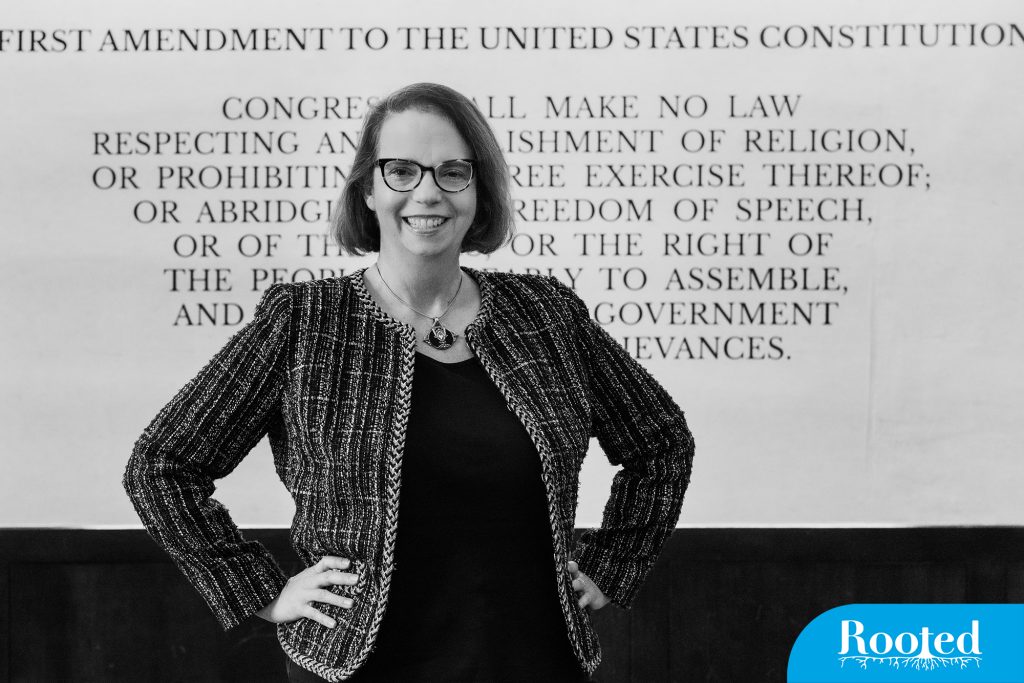Tori Smith Ekstrand has been contributing to research at Carolina for more than 10 years.

Tori Smith Ekstrand has worked for UNC-Chapel Hill for more than 10 years in a variety of roles, most recently as the Caroline H. and Thomas S. Royster Distinguished Professor for Graduate Education, in which she helps to lead the Royster Society of Fellows. She is an associate professor in the UNC Hussman School of Journalism and Media, where she teaches media law and the First Amendment.
What brought you to Carolina?
The intellectual climate and the students. I have the most amazing colleagues, and their work inspires me to conduct the kind of research that is forward-looking and serves the citizens of North Carolina.
I was a PhD student at UNC-Chapel Hill in the late 1990s. I had an amazing graduate student experience here, and I knew the excellence of both our undergraduate and graduate programs at the Hussman School. After receiving my doctorate, I was hired as an assistant professor at Bowling Green State University in Ohio. In 2011, I was invited to apply for a position at Carolina and jumped at the opportunity.
How has your role here changed over the years?
In 2014, not long after coming back to Carolina, I became co-director of the UNC Center for Media Law in Policy, an interdisciplinary research center run jointly out of the UNC School of Law and Hussman. The center’s work ranges from the legal and policy issues affecting traditional media organizations to the challenges posed by new communication technologies — including social media, the internet, and mobile technology, and the impact these have on governments, the economy, and cultural and social values throughout the world.
As center co-director, I was responsible for bringing together a diverse group of legal and communications scholars, media professionals, and practicing attorneys. I worked with graduate students to conduct media law and policy research and host public events — like UNC’s annual First Amendment Day.
I’m also an affiliate faculty member at UNC’s Center for Information, Technology, and Public Life (CITAP). This amazing group is led by several young scholars committed to interdisciplinary work. Together, we research the intersection of politics and digital technology, studying technologies in the context of the people who design, use, and govern them. Within this rapidly growing field, CITAP’s work is distinctive, uniting multiple areas of study and methodological approaches with a Southern, public-institutional view and strong shared research values.
In 2021, I became the Caroline H. and Thomas S. Royster Distinguished Professor for Graduate Education. The Royster Society of Fellows was created through the vision and generosity of Thomas and Caroline Royster in 1996. Through my distinguished professorship, I lead this premier doctoral recruitment fellowship at UNC-Chapel Hill and its annual conference with Carolina’s strategic global partners.
What’s kept you at Carolina?
I think North Carolina is a bellwether for what’s going on in the nation. Our campus contributes significantly to the conversations we are currently having about the state of democracy in the United States. Though these conversations in recent years have been challenging and often concerning, it seems to me that being at the nation’s oldest public university is obviously the place where those difficult conversations should occur.
This state has always been at the center of important change — from the onset of the Regulator movement before the Revolutionary War to the Civil Rights era of the 1960s and, more recently, the fight for same-sex marriage and the debates over gerrymandering. When you’re at UNC-Chapel Hill, you have a front row seat to American history and a role in advancing conversations about the health of our democracy.
What contribution are you most proud of?
This past summer, I helped take seven Royster Fellows and several faculty, administrators, and staff to the University of Tübingen in Germany, one of UNC-Chapel Hill’s strategic global partners, for our annual Royster Global conference. There, we met with students and faculty from the University of Tübingen and Kings College London. Royster Global aims to increase awareness and understanding of graduate education across international borders and helps prepare doctoral students — at UNC-Chapel Hill and beyond — for unprecedented global opportunities for research, networking, and employment.
The theme of the 2022 conference was “Disruption, Digitalization, and Disinformation: Communicating Research after COVID-19.” The conference considered the opportunities and obstacles for communicating academic research in a post-COVID world. It addressed the issues new researchers face in a time of accelerated digitalization and created a space for discussion about how to respond to these new problems and to capitalize on emerging opportunities.
I’m especially proud of our conversations about how disinformation campaigns have put pressure on democratic norms and what our response as academics can and should be. The conversation across disciplines and countries was dynamic and valuable. The students have made plans to continue those conversations virtually over the course of this year.
What is a uniquely Carolina experience you’ve had?
I’ve been able to see what Carolina produces as both a former student and now a faculty member and administrator. I’ve watched my UNC-Chapel Hill graduate school cohort become accomplished scholars and administrators in so many institutions across the U.S. and the world. And now, watching the lifecycle of a Carolina-student-turned-scholar is an amazing transformation. I feel so lucky to be a part of that every day I’m here.
Rooted recognizes long-standing members of the UNC-Chapel Hill community who have aided in the advancement of research by staying at Carolina. They are crucial to the UNC Research enterprise, experts in their fields, and loyal Tar Heels. Know someone we should feature? Nominate a researcher.